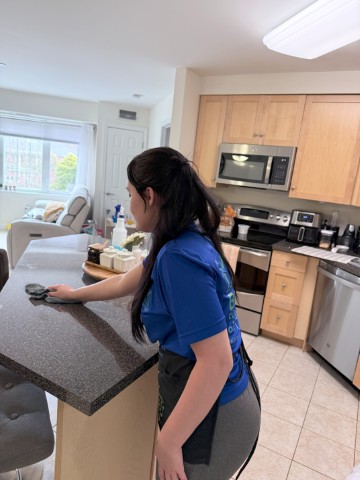Introduction
Living an eco-friendly lifestyle involves making conscious choices in all aspects of our lives, including our cleaning practices. When it comes to hose cleaning, adopting eco-friendly techniques can make a significant difference in reducing our environmental impact.
In this blog, we will explore various eco-friendly hose cleaning techniques that promote green living. By using natural, non-toxic ingredients and implementing sustainable practices, we can maintain clean and functional hoses while minimizing harm to the environment.
Let’s dive into these techniques and discover how we can contribute to a healthier planet through our hose cleaning routines.
The Power of Vinegar and Baking Soda

Vinegar Solution for Removing Dirt and Debris
Vinegar is a versatile and eco-friendly cleaning agent that can effectively remove dirt and debris from hoses. Create a vinegar solution by mixing equal parts of white vinegar and water in a spray bottle. Spray the solution on the hose, focusing on areas with dirt or stains.
Let it sit for a few minutes, then scrub the hose gently with a soft brush. Rinse thoroughly with water to remove any residue. Vinegar not only cleans the hose but also helps eliminate odors.
Baking Soda Paste for Stubborn Stains and Odors

Baking soda is another natural cleaning agent that can tackle stubborn stains and odors. Create a paste by mixing baking soda with a small amount of water.
Apply the paste to the stained areas of the hose and let it sit for a while. Scrub the hose gently with a brush to loosen the stains. Rinse the hose thoroughly with water to remove the baking soda residue. Baking soda is particularly useful for removing odors, leaving your hose fresh and clean.
Harnessing the Power of Nature: Sunlight and Fresh Air
Sun Drying for Natural Disinfection

One eco-friendly way to dry your hose after cleaning is by harnessing the power of the sun. Hang the hose in a sunny location, allowing it to air dry naturally.
Sunlight has natural disinfecting properties that can help kill bacteria and other microorganisms. By utilizing this method, you can avoid the use of energy-consuming drying methods and ensure a clean and hygienic hose.
Air Drying to Prevent Mold and Mildew Growth
Fresh air drying is another effective method to prevent mold and mildew growth in your hose. After cleaning, hang the hose in a well-ventilated area to allow air circulation.
This will help evaporate any remaining moisture and inhibit the growth of mold and mildew. Avoid storing the hose in a damp or enclosed space, as it can promote the growth of these harmful organisms.
Sustainable Water Usage

Water-Saving Techniques
Water conservation is an essential aspect of eco-friendly hose cleaning. Use water-saving techniques such as turning off the tap when not in use, using a nozzle with adjustable settings to control water flow, and using a bucket to collect and reuse water for other purposes.
By being mindful of water consumption, you can reduce waste and contribute to the conservation of this precious resource.
Rainwater Harvesting for Hose Cleaning

Consider utilizing rainwater for hose cleaning. Install a rain barrel or collection system to capture and store rainwater. This water can be used for various outdoor cleaning tasks, including cleaning your hose. Rainwater is free from chemicals and additives, making it an eco-friendly option for cleaning while conserving tap water.
Avoiding Harmful Chemicals
Eco-Friendly Cleaning Products
When choosing cleaning products for your hose, opt for eco-friendly options. Look for biodegradable and non-toxic cleaning products that are specifically designed for outdoor use.
These products are formulated to be safe for the environment while effectively cleaning your hose. Read labels and choose products that are free from harmful chemicals, such as chlorine, phosphates, and ammonia.
Non-Toxic Alternatives to Pesticides
If you encounter pests or insects around your hose, avoid using chemical pesticides that can harm the environment. Instead, opt for natural alternatives such as essential oils or homemade insect repellents.
For example, a mixture of water, peppermint oil, and dish soap can deter pests without causing harm to the ecosystem. These natural solutions are safe for your hose, plants, and the environment.
Proper Storage and Maintenance
Storing Hoses Safely to Extend Their Lifespan
Proper storage is crucial for maintaining the longevity of your hose. After each use, ensure the hose is fully drained to prevent water pooling and potential damage.
Store the hose in a cool, dry place away from direct sunlight. Consider using a hose reel or a designated hose hanger to keep it organized and prevent tangling.
Protecting your hose from harsh weather conditions and UV exposure will extend its lifespan and reduce the need for frequent replacements.
Regular Inspections and Maintenance to Prevent Leaks
Regular inspections and maintenance are essential to identify any potential leaks or damages early on. Check the hose regularly for cracks, leaks, or weak spots.
Replace any worn-out washers or fittings to prevent water wastage. By addressing these issues promptly, you can avoid water loss and ensure optimal hose performance.
Recycling and Reusing

Recycling Old or Damaged Hoses
When it’s time to replace your hose, consider recycling it instead of throwing it away. Check with local recycling centers or programs that accept rubber or plastic materials.
Recycling hoses helps reduce waste and promotes a circular economy.
Repurposing Hoses for DIY Projects
Old hoses can also be repurposed for various DIY projects. Cut them into smaller sections to create protective covers for sharp garden tools or construct a homemade sprinkler system.
Let your creativity flow and find new uses for old hoses, reducing waste and giving them a second life.
Spreading the Word: Educating Others

Sharing Eco-Friendly Hose Cleaning Tips with Friends and Neighbors
Spread the message of eco-friendly hose cleaning by sharing your knowledge and experiences with friends, family, and neighbors.
Encourage them to adopt sustainable practices and explain the benefits of using eco-friendly techniques. By raising awareness, you can inspire others to make a positive impact on the environment.
Encouraging Sustainable Practices in the Community
Consider organizing or participating in community events focused on sustainability and eco-friendly practices. Work with local organizations or gardening clubs to promote green cleaning techniques and host workshops on hose maintenance.
By working together as a community, we can amplify our efforts and create a more sustainable future.
Conclusion
Adopting eco-friendly hose cleaning techniques is a small but significant step towards a greener lifestyle.
By using natural ingredients, minimizing water usage, avoiding harmful chemicals, practicing proper storage and maintenance, and exploring recycling and reusing options, we can maintain clean and functional hoses while reducing our impact on the environment.
Furthermore, spreading the word and educating others about eco-friendly practices can create a ripple effect, inspiring a more sustainable approach to hose cleaning and other daily activities.
Let’s embrace these techniques and play our part in preserving our planet for future generations.







